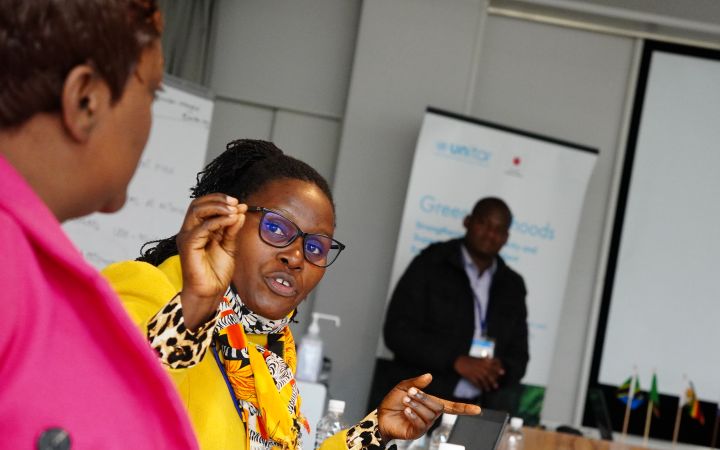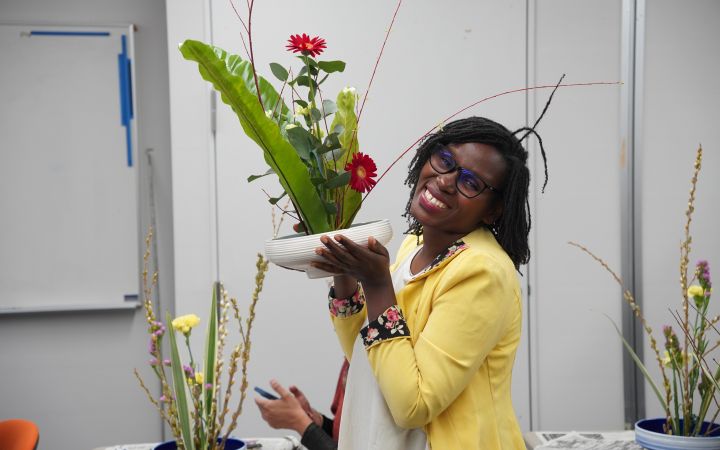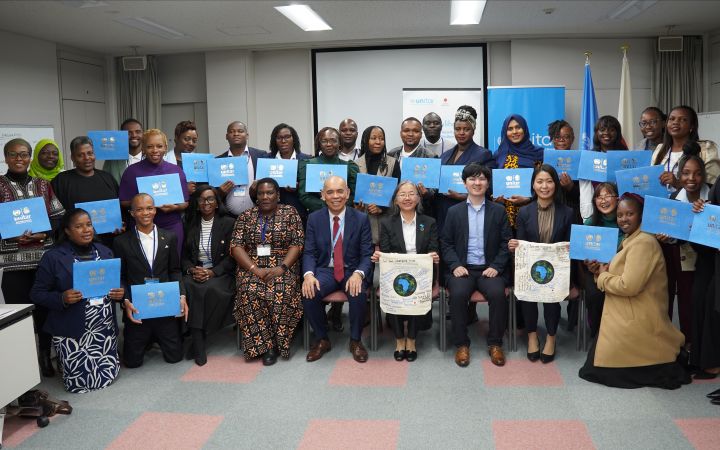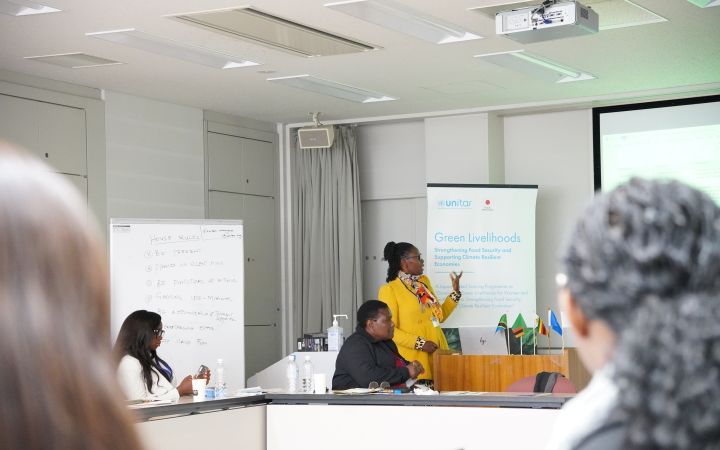- Angelamercy Baltazary is an Assistant Lecturer and researcher in Tanzania who converts organic waste into proteinous feeds for her aquaculture.
- Angela completed the UNITAR training programme "Developing Green Livelihoods for Women and Youth in Africa: Strengthening Food Security, Supporting Climate-Resilient Economies", where the top 24 performers were invited to Japan for the last phase.
- Angela learned practical and innovative strategies to help scale up her aquaculture venture by building her entrepreneurial and digital skills to develop a sustainable and climate-resilient venture.
27 August 2024, Hiroshima, Japan – Tanzanian entrepreneur and assistant lecturer Angela Baltazary is passionate about conservation. Through the UNITAR programme on green livelihoods, she developed and embarked on a project to convert the methane in organic waste to protein, which would then be used in her venture that breeds, raises and harvests fish for food. Using the organic waste in this way reduces greenhouse gases while contributing to public health and food security in Tanzania.
A VISIT TO THE PARK
Angela is a nature lover. Born and raised in the Kagera region, known for its lush landscape and wildlife, Angela discovered her life purpose when she visited Serengeti National Park as a high schooler. There, she heard about wildlife management for the first time and decided then and there that she was going to pursue it in her studies.
Angela now has a master’s degree in life sciences specializing in biodiversity conservation and ecosystems management and over 10 years of experience working in the conservation industry, climate change and adaptation.
UNITAR: REFINING A GREEN BUSINESS IDEA
Angela discovered the UNITAR programme one day when she was searching for grants and Ph.D. scholarships for women in sustainability. She was stunned to learn that there were people who taught about green livelihoods. Angela decided to apply and joined the programme when it started in September 2023.
The UNITAR programme Developing Green Livelihoods for Women and Youth in Africa: Strengthening Food Security, Supporting Climate-Resilient Economies aimed to build the entrepreneurial and digital skills of women and youth in Tanzania, Zambia and Zimbabwe, so they can develop climate-resilient businesses and create inclusive, environmentally responsible and viable employment and livelihood opportunities that contribute to climate mitigation . It started with two online phases with trainers and facilitators, and concluded with a final in-person phase in Japan for a workshop and study tour. The top 24 learners were brought to Tokyo and Hiroshima – Angela among them.
When she joined the UNITAR programme, Angela had been grappling with finding an alternative food source for her fish. The Ukraine war had limited the supply and raised prices of her usual fish feed. Remembering something from her undergraduate studies, Angela began looking into insect farming as an alternative: the methane found in organic waste could be converted into protein, which could then be used as fish food.
The idea addressed several issues at once. Not only would the approach potentially resolve Angela’s fish food problem while saving money, but it would also help lower greenhouse gases and contribute to organic waste management.
Living in Dar es Salaam, [which has] a population of about 5 million people, and with the projection that by 2025, about 12,000 tons of waste will be generated in Dar es Salaam alone, I knew I had to do my part in reducing organic waste and greenhouse gases.” —Angelamercy Baltazary, entrepreneur and UNITAR alumna (Tanzania)
Instead of burning the organic waste and adding greenhouse gases, Angela started feeding the organic waste to black soldier fly larvae. The larvae are rich in protein and are a nutritious meal for the fish. Furthermore, their oil can be extracted, and Angela sees the potential to later expand her business by using the oil in cosmetics for hair and skin.
Through the UNITAR programme, Angela conceptualized and developed the idea, supported by the resource persons and her peers. By the programme end, she was prepared to pilot test the concept and felt more confident about pitching to investors.
Angela relished her experience with UNITAR. She had a great time learning from the trainers, including in the earlier online phases. In Japan, she was interested in the country’s advanced technology in sustainability and environmental conservation and public awareness about segregating waste and conserving water and energy. She is grateful to the Government and People of Japan who funded the programme and urged UNITAR to continue the programme.
PASSING IT ON TO WOMEN IN A MALE-DOMINATED FIELD
When asked about challenges in the field, Angela was quick to name the male-dominated nature of the sciences. In her undergraduate wildlife management class, only 15 of the 67 students were women; in her master’s class, just two were women in her class of eight. Some people, she observes, think that women cannot handle the fieldwork in wildlife management and conservation.
Nonetheless being a woman scientist also gave her opportunities. It helped Angela secure a scholarship for her master’s degree, develop a broad mind and meet influential people. Angela believes it is time to encourage more women to venture into conservation, not least because women are the primary users of natural resources.
In Africa, women go out to get firewood, they fetch water, source for medicinal herbs from forests. When you educate women in the conservation space, you are contributing to saving our planet.” —Angelamercy Baltazary, entrepreneur and UNITAR alumna (Tanzania)
Angela finds it motivating to see other women in the field (“I know that if they can do it, I can do it too”). She hopes to be a role model for young women so they, too, see that they could join this field. She looks forward to putting into practice all that was taught to create a positive impact on more women and youth through her green business.
Contributed by United Nations Online Volunteer Ayobami Ashaolu.
ABOUT UNITAR
The United Nations Institute for Training and Research (UNITAR) is a dedicated training arm of the United Nations. In 2022, UNITAR trained over 395,000 learners around the world to support their actions for a better future. UNITAR has a global presence, with offices in Geneva, Hiroshima, New York and Bonn and networks around the world.
UNITAR Division for Prosperity offers world-class learning and knowledge-sharing services to present and future change-makers from around the world. Through our innovative training and learning opportunities – built on robust adult learning principles – we seek to promote sustainable, inclusive and just economic development and catalyse the creation of decent employment opportunities for all.
UNITAR Division for Prosperity supports youth and women in particular to address growing inequalities. We work in solidarity with diverse partners at the local, regional and global levels to propel the 2030 Agenda and Sustainable Development Goals and achieve an inclusive, sustainable and prosperous world.





